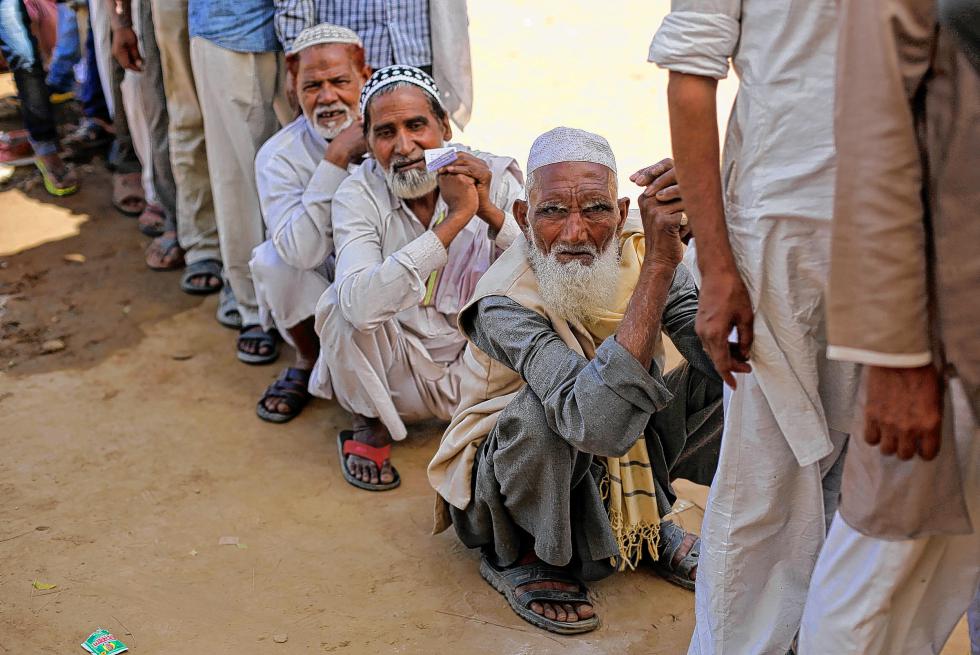
India is voting in the biggest day of the general election pitting the ruling Congress party against the main opposition BJP.
Polling takes place in 121 seats in 12 states, including the key states of Karnataka, Rajasthan, Uttar Pradesh, Bihar, Maharashtra and West Bengal.
The nine-phase vote began on April 7 and will conclude on May 12. Votes will be counted on May 16.
More than 814 million Indians are eligible to vote in the polls.
Polling has been already completed in 111 seats, and voter turnout in most states has been higher than in 2009.
April 17 is one of the most critical days of voting spread across 12 states, from Indian-administered Kashmir in the north, to the information-technology hub of Bangalore in the south, Rajasthan in the west and the tea-growing Himalayan town of Darjeeling in the east.
With all of its 28 seats going to polls on Thursday, the southern state of Karnataka is a key battleground.
Bangalore South is one of the keenly contested seats in the state with Congress party’s Nandan Nilekani, BJP’s Ananth Kumar and the Aam Aadmi Party’s (AAP) Nina Nayak as candidates.
Nandan Nilekani is the billionaire co-founder and former CEO of Infosys, one of India’s largest IT services firms, while Ananth Kumar is a former federal minister.
The anti-corruption Aam Aadmi (Common Man’s) Party, which secured a spectacular result in local polls in Delhi last year, offers a challenge to the main parties.
Several smaller regional parties are also in the fray and if no single party wins a clear majority, they could play a crucial role in the formation of a government.
Thousands of police and paramilitary security personnel have been deployed across the country to ensure smooth polling.

The marathon vote is being staggered over five weeks for security and logistical reasons.
The main contest in the elections is between the Congress, led by Rahul Gandhi, and the BJP, led by the charismatic and controversial Hindu nationalist leader Narendra Modi.
Narendra Modi, who is ahead in all the pre-election opinion polls, is the leader of Gujarat state, which witnessed one of India’s worst anti-Muslim riots in 2002.
The BJP has promised to improve the economy and infrastructure and curb corruption if it wins in the general elections.
The Congress party has promised “inclusive growth” if it returns to power, with a raft of welfare schemes, including a right to healthcare for all and pensions for the elderly and disabled.
Any party or a coalition needs a minimum of 272 lawmakers to form a government.
Dates when different states and Union Territories vote:
Andaman and Nicobar islands: April 10
Andhra Pradesh: April 30 and May 7
Arunachal Pradesh: April 9
Assam: April 7, 12 and 24
Bihar: April 10, 17, 24, 30, May 7 and 12
Chandigarh: April 10
Chhattisgarh: April 10, 17, 24
Dadra and Nagar Haveli: April 30
Daman and Diu: April 30
Delhi: April 10
Goa: April 17
Gujarat: April 30
Haryana: April 10
Himachal Pradesh: May 7
Jammu and Kashmir: April 10, 17, 24, 30 and May 7
Jharkhand: April 10, 17, 24
Karnataka: April 17
Kerala: April 10
Lakshadeep: April 10
Madhya Pradesh: April 10, 17, 24
Maharashtra: April 10, 17, 24
Manipur: April 9, 17
Meghalaya: April 9
Mizoram: April 9
Nagaland: April 9
Odisha: April 10, 17
Puducherry: April 24
Punjab: April 30
Rajasthan: April 17 and 24
Sikkim: April 12
Tamil Nadu: April 24
Tripura: April 7, 12
Uttarakhand: May 7
Uttar Pradesh: April 10, 17, 24, 30, May 7 and 12
West Bengal: April 17, 24, 30, May 7 and 12
[youtube hJYquPYXxk4 650]